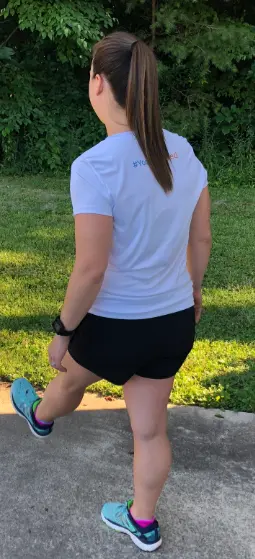
With Carrie Rhodes, PT
Physical therapist Carrie Rhodes recently
1.) There are two running plans listed- one for beginners and one for advanced. How do I know which training plan to pick?
A beginner is someone that is running less than 10 miles a week and is just starting to run on a regular basis. An advanced runner has a few races, even 5K's, under their belt already and have built up a good amount of stamina.
2.) There are instructions to cross-train on the training plans. What does cross-training mean?
It's really any activity besides running so you don't exhaust those same muscles. I'm a big fan of cardio exercises, like the elliptical, that can help you maintain
3.) What is the difference between a run that is based around speed work and an easy run?
Speed work is more about what your goal pace is going to be. You don't want to run all of your miles at that pace because if you're training at that pace you are going to burn out pretty quickly and be more prone to injuries. Easy runs, however, help get the miles under your legs. You're not putting that same pounding effort through the runs.
4.) Should you stretch before you run? Can you show us some of those exercises?
Before you run, I recommend a dynamic warm-up to help get the blood flowing to the muscles. You want to get your heart rate up and also warm those muscles up. These include...
Leg swings, where you swing your legs back at forth

High knees, where you focus on running in place while getting your knees up really high

Carioka Drill, which is a cross-stepping movement that propels the body laterally

5.) How about stretching after a run?
You should first walk a little bit as a cool down. Do a little bit of static stretching, meaning hold stretches for a longer period of time. Foam rolling is also very beneficial. You want to spend about 5-10 minutes of time after your run stretching.
6.) What common running injuries should I be cautious about?
Runner's knee is a super common injury as you build up mileage. You'll feel
7.) If I do find myself injured, should I take a few days off? How would I jump back into the training plan?
If you're getting
8.) What should I eat before running? After running?
You don't have to carb load for short runs, but always have something with a good mixture of carbs and
9.) Any tips for running in the heat?
Listen to your body. You will be running at a higher intensity when it's warmer. Slow down and give yourself a window to breathe. Even opt for the treadmill if it's super hot out so you don't get heat exhaustion. You may also want to wear sweat-wicking clothing or body glide to avoid chafing.
10.) Any advice for someone training for a race for the first time?
Have fun! Don't take yourself too seriously. Enjoy the race and learn to love it. The runner's high doesn't happen every day but stick with it and you'll be really happy with the end result.
WHAT’S NEXT:
- Ready to start a training plan of your own? Sign up for the OrthoCarolina Classic 10k or the Around the Crown 10k and use one of our physical therapist-authored plans to get going.
- View the entire interview with Carrie
Back




Leave a Comment